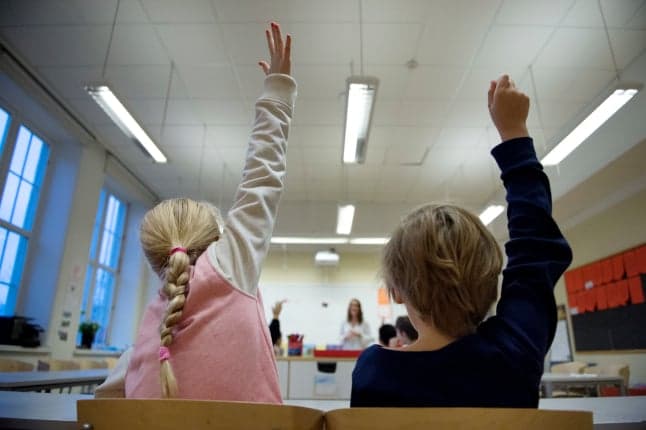Sweden's new guidelines for children and coronavirus testing

In a set of new guidelines, Swedish health authorities recommend children to get tested if they show symptoms of coronavirus infection, so that they can return to school if they are otherwise well.
Sweden's Public Health Agency released the new guidelines, aimed at healthcare providers, infectious disease units, laboratories and regional decision-makers, late on Monday.
They recommend that children in mainly primary or high school – and sometimes nursery school if there's been a local increase in cases – be tested for the coronavirus if they show symptoms that indicate an ongoing infection.
If the test is negative, it would allow children to return to school even with mild symptoms as long as they are otherwise well, writes the agency.
If they test positive they should stay at home and follow the same guidelines as adults.
If no test has been carried out, the child needs to stay at home for at least two days after they are symptom-free, writes the Public Health Agency. But if the child has lingering mild symptoms – "for example a dry cough and mild runny nose" – a week after they fell ill, they may return to school.
The guidelines state that school age children and teenagers should be tested to the same extent as adults, while nursery school children (under the age of six) should primarily stay at home unless there is a local outbreak.
Sweden closed schools for over-16s in spring, but generally kept them open for younger children throughout the pandemic. Schools reopened for the autumn semester last month, including for teenagers aged over 16.
"Our view on children and infectivity has not changed. Our previous assessment remains that children transmit less than adults and that the school environment has not been a driving force in the spread of infection," said Public Health Agency microbiologist Karin Tegmark Wisell in a statement.
The most common symptoms of Covid-19 in children or teenagers are a cough and/or a fever. Other symptoms include: sore throat, difficulties breathing, muscle ache, runny nose, blocked nose, headache – and symptoms such as diarrhea and vomiting are more common in children than adults.
Comments
See Also
Sweden's Public Health Agency released the new guidelines, aimed at healthcare providers, infectious disease units, laboratories and regional decision-makers, late on Monday.
They recommend that children in mainly primary or high school – and sometimes nursery school if there's been a local increase in cases – be tested for the coronavirus if they show symptoms that indicate an ongoing infection.
If the test is negative, it would allow children to return to school even with mild symptoms as long as they are otherwise well, writes the agency.
If they test positive they should stay at home and follow the same guidelines as adults.
If no test has been carried out, the child needs to stay at home for at least two days after they are symptom-free, writes the Public Health Agency. But if the child has lingering mild symptoms – "for example a dry cough and mild runny nose" – a week after they fell ill, they may return to school.
The guidelines state that school age children and teenagers should be tested to the same extent as adults, while nursery school children (under the age of six) should primarily stay at home unless there is a local outbreak.
Sweden closed schools for over-16s in spring, but generally kept them open for younger children throughout the pandemic. Schools reopened for the autumn semester last month, including for teenagers aged over 16.
"Our view on children and infectivity has not changed. Our previous assessment remains that children transmit less than adults and that the school environment has not been a driving force in the spread of infection," said Public Health Agency microbiologist Karin Tegmark Wisell in a statement.
The most common symptoms of Covid-19 in children or teenagers are a cough and/or a fever. Other symptoms include: sore throat, difficulties breathing, muscle ache, runny nose, blocked nose, headache – and symptoms such as diarrhea and vomiting are more common in children than adults.
Join the conversation in our comments section below. Share your own views and experience and if you have a question or suggestion for our journalists then email us at [email protected].
Please keep comments civil, constructive and on topic – and make sure to read our terms of use before getting involved.
Please log in here to leave a comment.